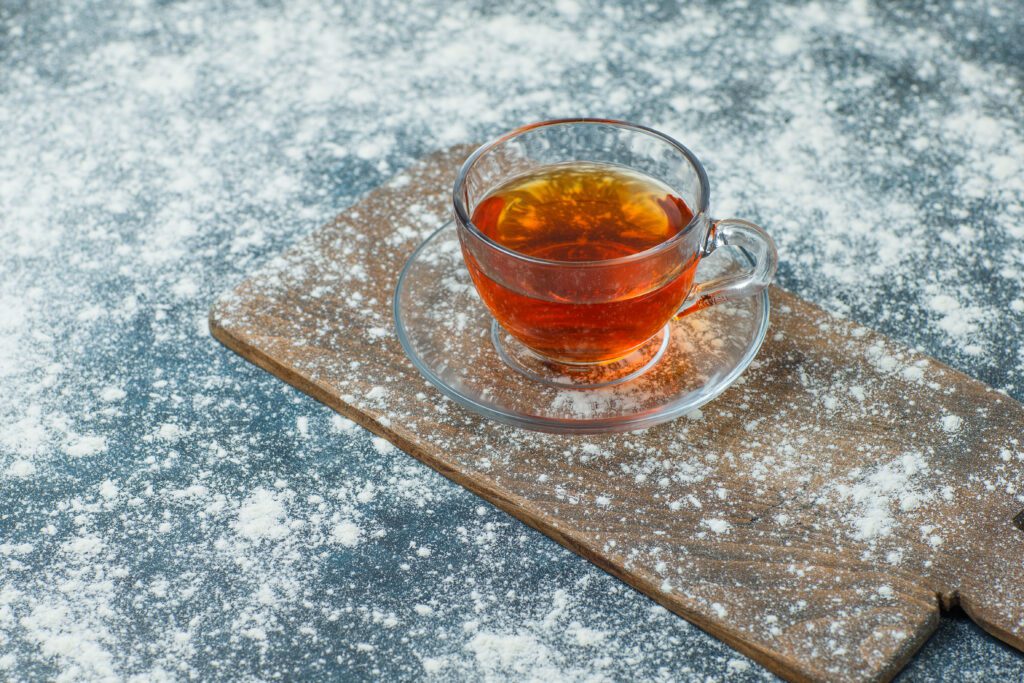Best Tea for Cold and Flu, if you’re suffering from flu or cold symptoms, one of the last things you want is to be miserable while waiting for your body’s defense mechanisms to kick in and combat illness. While prescription medicines offer relief for symptoms associated with illness, more people are turning towards natural therapies like herbal teas in order to relieve their discomfort.
Consuming tea during flu and cold season is not only beneficial in keeping hydrated but also can offer numerous health advantages that will boost immunity. We will review some of the top teas for colds and flu symptoms as well as how these effective remedies help relieve symptoms.

Why Tea Is an Effective Remedy for Cold and Flu
Tea, specifically herbal tea, is more than an invigorating beverage to drink during a cold. Certain varieties contain substances that may help ease symptoms associated with cold and flu. Here are a few reasons tea can help during illnesses:
Hydration Hydration: Staying well-hydrated when sick is of paramount importance. Tea can help replenish fluids lost through dehydration as well as reduce mucus build-up that may contribute to dehydration—both common issues associated with cold and flu viruses.
Soothing Effects: Hot liquids such as tea can offer soothing relief from sore throats. In addition, their warmth helps relieve coughing and congestion symptoms as well as relax and comfort the body during times when feeling down.
Organic compound: Teas contain herbs and components that have been found to boost immunity and fight diseases, such as ginger, Echinacea, and elderberry, that possess anti-inflammatory and antiviral properties to speed healing of your body faster.
Antioxidants: Many tea varieties, including herbal and green tea varieties, contain plenty of antioxidants, which are proven to lower inflammation and combat oxidative stress, helping strengthen your immune system by supporting anti-inflammation.
Relaxation: Tea may provide a soothing effect and promote more restful sleep, which is crucial when working to combat disease.
Best Teas to Help Fight Cold and Flu
There are various kinds of tea that may help soothe those experiencing illness. Here are a few effective options and their potential advantages:
1. Ginger Tea
Benefits: The ginger plant has long been utilized as part of traditional medicine due to its powerful antioxidant and anti-inflammatory properties, providing relief for sore throats, nausea, and congestion. Furthermore, ginger contains antimicrobial qualities that aid in fighting viral infections like flu and colds.
What It Does: Components found in ginger, such as gingerol, are known to help reduce inflammation, reduce fever, and boost immunity. Furthermore, ginger tea may stimulate sweating, which could lower body temperatures during an acute fever period.
Prep for Ginger Tea: To make ginger tea, cut fresh ginger root and steep in hot water for approximately five to ten minutes before adding lemon or honey for additional soothing benefits.
2. Chamomile Tea
Its benefits: Chamomile is known for its relaxing and calming properties, making it especially helpful when trying to sleep when sick. Anti-inflammatory and mild antiseptic properties of chamomile can reduce flu and cold symptoms by helping you relax better at night.
What it does: Chamomile contains apigenin, a flavonoid that binds to receptors in the brain to promote relaxation and better sleeping patterns. Furthermore, its antibacterial properties may assist your body in healing from infections more quickly.
Prep Work for Chamomile Flower Infuser: Place dried chamomile flower petals into hot water and let sit for approximately five minutes, adding lemon or honey if desired for additional taste and soothing properties.


3. Peppermint Tea
Benefits: Peppermint tea is an acclaimed solution for treating flu and cold symptoms due to its cooling effects and ability to ease nasal congestion. Peppermint’s natural decongestant, menthol, can help clear away congestion in the airways to open them up faster, thereby decreasing coughing episodes and sore throats.
How It Works: Peppermint contains menthol, which relaxes throat muscles to ease coughing and throat pain, clears nasal passages, and relieves tension in sinuses.
Prep: The ideal approach is to use freshly or dried peppermint leaves in hot water for approximately five minutes before straining them out and boiling them as tea leaves.
4. Echinacea Tea Benefits
Benefits: Echinacea is one of the best-known plants to increase immunity and combat disease. Studies have demonstrated its efficacy against colds by stimulating white blood cell production, which aids in fighting infection and decreasing duration and severity.
What it does: Echinacea contains compounds that boost your body’s immune system, helping prevent viral spread and strengthening its ability to fight off infections.
Preparing: Echinacea tea bags or dried flower petals with hot water for about 10-15 minutes. Drink regularly throughout the day, particularly if suffering from flu or cold symptoms.
5. Lemon and Honey Tea
Its Benefits: Honey and lemon tea can provide effective relief from flu and cold symptoms. Lemon contains high concentrations of vitamin C that may aid in strengthening immunity, while honey has antibacterial properties to soothe sore throats and provide immediate comfort.
What It Does: Honey can help soothe and protect the throat, decreasing irritation and coughing. Lemon’s acidity removes phlegm and mucus while its vitamin C content may assist your immune system in functioning optimally.
Prepare: A relaxing beverage can be prepared easily by mixing one teaspoon of honey with freshly squeezed lemon juice into hot water in a cup and stirring thoroughly before sipping this soothing drink.
6. Benefits of Thyme Tea
Benefits: Thyme is often used to treat respiratory conditions like bronchitis, coughs, and colds. Antiseptic in nature, it helps clear mucus from your system while relieving chest congestion.
How It Works: Thyme is a plant with ingredients that act as natural expectorants, helping reduce mucus and phlegm accumulation in your chest to make breathing easier while lessening coughing episodes.
Prep Time Prep Time: Submerge fresh or dried leaves of thyme into boiling water for approximately five to ten minutes to prepare them for use.
7. Elderberry Tea
Benefits: Elderberries contain powerful antioxidants and essential vitamins like Vitamin C that have long been used to alleviate symptoms associated with flu. Studies suggest that elderberries may help shorten the duration and severity of influenza symptoms.
How It Works: Elderberries contain anthocyanins, a group of compounds that helps strengthen immunity by blocking viruses from infiltrating healthy cells and inflicting infections such as colds and influenza. Elderberry is particularly effective at relieving inflammation associated with colds and influenza.
Prep Work: Elderberry tea can be made using either dried elderberries or purchased as part of a tea blend already prepared. After adding water and steeping for approximately 10 minutes, enjoy!


Additional Tips for Cold and Flu Relief
Staying hydrated: By drinking plenty of fluids like tea, water, and broths will help to decrease mucus production, prevent dehydration, and ease throat pain.
Utilize a Humidifier: Rest is of utmost importance in recovery from illness. Ample sleep allows your body to restore and repair itself while rebuilding its immune system.
Tea for Colds and Flu (FAQs)
1. Can tea help with influenza or cold symptoms?
Although tea alone may not provide a cure for colds and flus, herbal remedies like ginger tea, chamomile tea, or echinacea tea may help ease symptoms while increasing immunity. Such herbs as can be effective at soothing congestion, sore throats, or inflammation—however, if symptoms continue or worsen, medical advice should be sought immediately.
2. Which tea can effectively treat sore throats?
Honey-lemon and chamomile teas are among the best choices to ease throat pain, with chamomile acting as an anti-inflammatory, while honey provides relief by coating and soothing irritation in the throat.
3. Does peppermint tea help with relieving congestion?
Peppermint tea contains menthol, which can help relieve nasal congestion and clear airways. Furthermore, its cooling effect soothes throat irritations while helping reduce coughing episodes.
4. Should I drink tea when suffering from fever?
An illness that results in fever can leave us dehydrated, but drinking hot tea with ginger can help regulate body temperature and reduce fever by its diaphoretic properties (i.e., promoting sweating).
5. What is the optimal time and method to enjoy tea during an illness?
Tea should be drunk 2-3 times throughout the day if you’re sick, to stay well-hydrated. Be aware of your body; if thirstiness occurs more frequently, drink more tea to stay well hydrated.
6. Can children drink tea to treat both colds and flu symptoms?
Lemon-honey and chamomile herbal teas may be suitable for children in small amounts; however, always consult your child’s physician first, as some herbs may not be appropriate for smaller children.
Conclusion
Herbal teas can help relieve cold and flu symptoms in many ways, from soothing sore throats to clearing congestion and strengthening immunity. Teas such as ginger, chamomile, and peppermint offer natural ways of finding comfort when needed most—just be sure to take breaks, drink lots of water, and seek medical advice if symptoms continue.
Wellness doesn’t always lie within a cup of tea—sometimes more is required to feel better.

